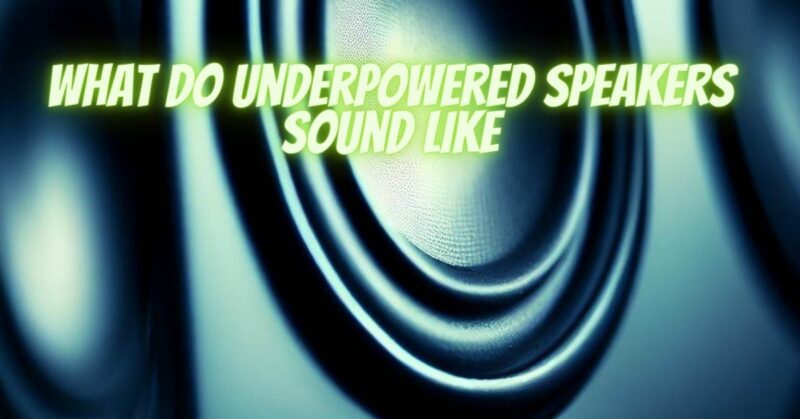In the world of audio, proper power amplification is crucial for achieving the best sound quality and performance from speakers. Underpowering speakers can lead to various issues that compromise the audio experience. In this article, we will explore what underpowered speakers sound like, the impact on audio quality, and how to avoid this common pitfall in audio setups.
- The Sound of Distortion
One of the most noticeable signs of underpowered speakers is distortion in the audio output. When speakers are not receiving enough power to handle the demands of the audio signal, they may begin to distort the sound. This distortion can manifest as crackling, buzzing, or harshness in the sound, making it unpleasant to listen to music or other audio content.
- Reduced Volume Levels
Underpowered speakers may struggle to reach optimal volume levels. Even at maximum volume settings, the sound may still be significantly lower and lacking the clarity and fullness that the speakers are capable of producing. This limitation can be frustrating, especially in large rooms or outdoor settings where higher volume levels are required.
- Lack of Dynamic Range
Dynamic range refers to the difference between the softest and loudest sounds in an audio recording or performance. Underpowered speakers may struggle to reproduce the full dynamic range of the audio signal. As a result, the music or content may sound flat, with a lack of depth and expression, ultimately diminishing the emotional impact of the audio.
- Inadequate Bass Response
Underpowering speakers can negatively impact their ability to reproduce bass frequencies effectively. Bass notes may sound weak, lacking the impact and depth that they should provide. The low-end frequencies may become muddy and indistinct, robbing the audio of its richness and immersive quality.
- High-Frequency Distortion
Underpowered speakers may also struggle with high-frequency reproduction. High-frequency distortion can result in shrill and piercing sounds, making the audio uncomfortable to listen to, especially at higher volumes.
- Speaker Strain and Potential Damage
Consistently underpowering speakers can lead to speaker strain and, in some cases, damage. When speakers are forced to handle power levels beyond their capacity, it can cause the speaker components to overheat and wear out prematurely. This strain can ultimately lead to a decline in audio performance and even result in permanent damage to the speakers.
- Ensuring Proper Power Amplification
To avoid the pitfalls of underpowered speakers, it is essential to ensure proper power amplification:
a. Match Speaker Wattage and Amplifier Power: Select an amplifier that matches the wattage and power requirements of your speakers. Overpowering speakers can also cause problems, so it’s crucial to find a balance that optimizes audio performance.
b. Consider Active or Powered Speakers: Active or powered speakers have built-in amplifiers, ensuring an optimal match between the speakers and amplification. These speakers are designed to work seamlessly together, eliminating the risk of underpowering.
c. Consult with Audio Professionals: If you’re uncertain about the right amplifier-speaker pairing, consult with audio professionals who can guide you to make the best choices for your specific setup and audio preferences.
Underpowered speakers exhibit several distinct characteristics that negatively impact audio quality and performance. Recognizing the signs of underpowered speakers, such as distortion, reduced volume levels, and inadequate bass response, is crucial to achieving the best audio experience. By ensuring proper power amplification and matching speakers with the appropriate amplifier, you can enjoy optimal sound quality, prevent strain on your speakers, and preserve their longevity for years of satisfying audio enjoyment.


